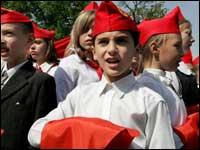Transcript
BOB GARFIELD:
Another struggle to control the message is underway in Russia’s public schools. Two new Kremlin-approved teaching manuals seem to rewrite Russian history, rather than explain it. With lessons like, quote, “Entry into the Club of Democratic Nations Involves Surrendering Part of Your National Sovereignty to the U.S.,” the manuals smack of Soviet-era history texts.
The Kremlin argues that the textbooks currently in use might be factual, but they’re overly negative and just plain depressing. They say these new manuals will teach Russians to be proud of their country’s past.
Andrew Osborn is the Moscow correspondent for The Wall Street Journal. He says the manuals are striking because of the relentlessly rosy glow they cast on the nation’s most recent history.
ANDREW OSBORN:
For the first time, they covered the entire Putin period, and they have indeed provided a point-by-point justification of some of his most controversial policies. So if you like, both of these manuals really do read like a kind of a hymn to the Putin era.
BOB GARFIELD:
Now, using textbooks to mold the world views of children is not unique to Russia. We’ve seen examples in Palestine and elsewhere in the Arab world of texts that demonize Jews, for example, or, you know, even in the States, the attempts in Kansas and Pennsylvania to turn evolution into a debate in school science texts. Is there any way for you to judge whether this is a lesser or a greater sin that’s occurring now in Russia?
ANDREW OSBORN:
I think it’s hard to compare, but I think maybe the best comparison is with Russia’s own history, and that is to say the Soviet period, when there was indeed only one textbook and pupils were simply not given a chance to consider alternative interpretations of history.
So I think the fear is that the current occupants of the Kremlin are looking back to the Soviet period and are kind of using that as a template in some way.
BOB GARFIELD:
But I can say that one thing that is certainly different from the Soviet era of pure propaganda is Soviet school kids had no access to anything else that was not printed in their textbooks. Today’s schoolchildren can go onto the Internet and see that their textbooks are so starkly different from essentially all other versions of history that are available to them at a mouse click.
ANDREW OSBORN:
I think you’re right. I mean, already a debate is raging, you know, on blogs and on the Internet, about this whole subject. So certainly, I think the Kremlin would have very much liked to have done all this on the quiet and was hoping that nobody would really notice.
But that said, I mean, a lot of people live in pretty isolated parts of Russia where, in fact, they don’t have access to these same sources, so they would be more likely, if you like, to take this as received wisdom.
BOB GARFIELD:
Now, what we’re discussing here is manuals for teachers. It’s not textbooks themselves. And the Education Minister, Andrei Fursenko, has told Izvestia that Russia will not return to the Soviet practice of mandating a single textbook. Why do you suppose Putin didn’t simply have a single textbook, Soviet style, with his view of Russian history?
ANDREW OSBORN:
Well, he really does care about what people think of him in the West. He doesn’t want to give people ammunition to say you’re just a kind of throwback to the Soviet era, because he argues that he’s not that.
Okay, no, he’s not a democrat in the western sense, but he argues that he has brought stability and prosperity and that he’s moving slowly in the direction of democracy, at a pace which Russia can withstand.
BOB GARFIELD:
One of the most disturbing aspects is how the Russian people seem, on the whole, to be just taking the whole thing with a shrug, that they’re more than willing to exchange absolute freedom for stability. Is there any evidence of a groundswell of negative reaction to this, now that the story is leaking out?
ANDREW OSBORN:
There certainly has been negative reaction, and that has been played out across the country’s national newspapers. But I would stress that we’re talking about fairly rarified elite circles here who are getting worked up about these kind of issues.
For the vast majority of people, this kind of story is really not an issue, and I think, by and large, that really Russians are beginning to feel good about themselves after the ‘90s, which for many people here was a rather depressing and humiliating decade. And when we have seen opposition demonstrations, they have been very forcibly dispersed or very tightly controlled, at the very least.
So it’s really one-way traffic here right now. It’s one point of view, it’s one vision of this country and indeed of the world, which is really dominating here.
BOB GARFIELD:
Andrew, thank you very much.
ANDREW OSBORN:
Thank you very much.
BOB GARFIELD:
Andrew Osborn is the Moscow correspondent for The Wall Street Journal.

